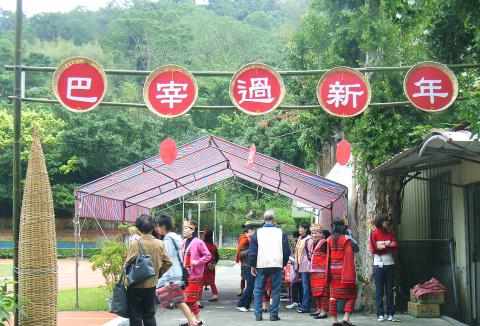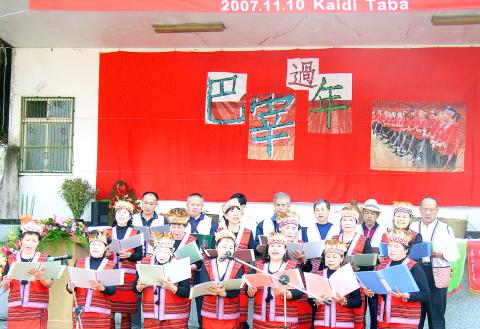The Pazeh people of Liyutan Village (鯉魚潭村), located in the hills of Sanyi Township (三義鄉), Miaoli County, and one of the last vigorous strongholds of Taiwan’s neglected plains Aboriginal groups, also known as the lowland Pingpu people, will hold a traditional harvest festival tomorrow.
“The harvest festival is for family members to return home and celebrate our Pazeh traditions after the autumn harvest each year, so that we will not forget the old culture passed down from our ancestors,” said Kuo Pei-shuan (郭珮軒), a Pazeh clan member from the village. She added, “It is becoming more difficult because we face much pressure from society to assimilate,” she said.
Kuo said that although it is a Pazeh ritual, all visitors wanting to celebrate the harvest festival are welcomed guests.

Photo: Jason Pan, Taipei Times
The event begins at 9:30am with cultural events taking place throughout the morning, and include dance and music by Miaoli County’s Taokas Aboriginal community, and the Saisiyat and Atayal indigenous groups. The Pazeh feast begins at 1:30 pm.
Besides taking in dance and music performances by the Pazeh and other Aboriginal groups, all guests are invited to join the kantian (牽田) ritual, where villagers join hands and give thanks for a bountiful harvest this year, and to wish for a good yield next year.
Following the dance, guests are invited to gather with the villagers for an open-air Pazeh feast. The luncheon, free to anyone attending the festival, consists of Pazeh traditional dishes, set along the tables together with local Miaoli County’s Hakka and Hoklo cuisine.

Photo: Jason Pan, Taipei Times
“We organized the Pazeh festival to preserve our culture and our identity. It is also for elders to teach the traditions to the younger generation. Our effort is also to show Taiwan society that the traditions of the Pazeh are alive and well, so we request to be recognized as one of Taiwan’s [official] Indigenous groups,” said Pan Ta-chou (潘大州), head of the Miaoli Pazeh People Culture Association (苗栗縣巴宰族群協會).
He added, “We have elders still able to speak the Pazeh language. We hope to record and document this language. We have set up teaching programs, so our children are learning it in the village,” Pan said.
Pazeh is one of the 10 indigenous Lowland Pingpu People (the others are: Ketagalan, Taokas, Papora, Kahabu, Babuza, Hoanya, Siraya, Tavorlong and Makatao). Despite their demand for inclusion, the government has yet to officially recognize them.
How to get there:
By Car: National Highway No. 1, Sanyi Exit, onto Provincial Road No. 13. Drive toward the Liyutan Reservoir (鯉魚潭水庫) and follow the signs to Liyues Elementary School (鯉魚國民小學)
Public Transport and taxi: Take the train to Sanyi Station. From there ask rail station officers where to take a local bus to Luyutan School, or you can take a taxi from the rail station (roughly NT$200)

April 14 to April 20 In March 1947, Sising Katadrepan urged the government to drop the “high mountain people” (高山族) designation for Indigenous Taiwanese and refer to them as “Taiwan people” (台灣族). He considered the term derogatory, arguing that it made them sound like animals. The Taiwan Provincial Government agreed to stop using the term, stating that Indigenous Taiwanese suffered all sorts of discrimination and oppression under the Japanese and were forced to live in the mountains as outsiders to society. Now, under the new regime, they would be seen as equals, thus they should be henceforth

Last week, the the National Immigration Agency (NIA) told the legislature that more than 10,000 naturalized Taiwanese citizens from the People’s Republic of China (PRC) risked having their citizenship revoked if they failed to provide proof that they had renounced their Chinese household registration within the next three months. Renunciation is required under the Act Governing Relations Between the People of the Taiwan Area and the Mainland Area (臺灣地區與大陸地區人民關係條例), as amended in 2004, though it was only a legal requirement after 2000. Prior to that, it had been only an administrative requirement since the Nationality Act (國籍法) was established in

Three big changes have transformed the landscape of Taiwan’s local patronage factions: Increasing Democratic Progressive Party (DPP) involvement, rising new factions and the Chinese Nationalist Party’s (KMT) significantly weakened control. GREEN FACTIONS It is said that “south of the Zhuoshui River (濁水溪), there is no blue-green divide,” meaning that from Yunlin County south there is no difference between KMT and DPP politicians. This is not always true, but there is more than a grain of truth to it. Traditionally, DPP factions are viewed as national entities, with their primary function to secure plum positions in the party and government. This is not unusual

US President Donald Trump’s bid to take back control of the Panama Canal has put his counterpart Jose Raul Mulino in a difficult position and revived fears in the Central American country that US military bases will return. After Trump vowed to reclaim the interoceanic waterway from Chinese influence, US Defense Secretary Pete Hegseth signed an agreement with the Mulino administration last week for the US to deploy troops in areas adjacent to the canal. For more than two decades, after handing over control of the strategically vital waterway to Panama in 1999 and dismantling the bases that protected it, Washington has